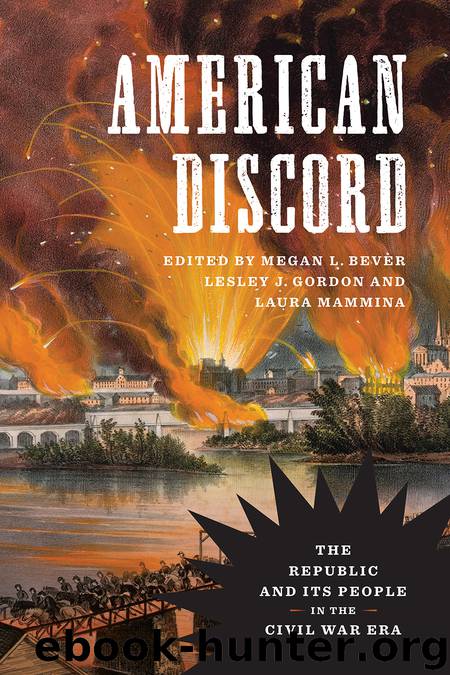American Discord by Lesley J. Gordon

Author:Lesley J. Gordon
Language: eng
Format: epub
Publisher: LSU Press
Published: 2020-05-14T16:00:00+00:00
Domesticity in Conflict
Union Soldiers, Southern Women, and Gender Roles during the American Civil War
LAURA MAMMINA
After a year and a half in the Union army, Kentuckian Alfred Pirtle had reason to find fault with military service. While Pirtle had no complaints with his rank, his company, his commanding officers, the amount of marching, or the quality of food or accommodations, he bemoaned that he was “losing a good deal of [his] small share of refinement.” He was not the only one who felt this way. The night before, he and his comrades sadly reflected that they were not “as good men as when we joined the service.” The cause of Pirtle’s problem, the reason that army life chipped away at civilized behavior and turned men into savages and animals, was this: he and his friends were deprived of the “pleasure of ladies society.”1
By the time of the American Civil War, many middle- and upper-class white Americans—a group of which Pirtle was a part—had espoused strict and complementary notions of gender. Trumpeted in sermons, periodicals, novels, and even textbooks, these ideas insisted that men, formed for daring deeds and yet prone to vice, required the civilizing and moralizing influence of women in order to be made fit for society and fit for heaven.2 Although the cult of domesticity was formed in northeastern urban areas and applied specifically to the burgeoning middle class, its influence was felt across the country. White middle- and upper-class southerners ascribed to notions of domesticity, and white yeomen and free and enslaved black women at least felt the influence of these ideas, if they did not embrace certain elements themselves.3 Even white women moving west on overland trails carried these aspirations with them, for, as one historian observes, women hoped that “th[e] domestic sphere would provide . . . social and cultural stability in a changing world.”4 War proved the persistence of these ideas. As Pirtle and his friends demonstrate, to be without the society of women was to return to an animal-like state. These attitudes explain why, in the midst of the American Civil War, white and black Union soldiers and southern women not only interacted but also actively sought each other out in social settings. Complementary gender roles, pervasive throughout the United States and ingrained in many since their youth, discouraged men and women from forgoing each other’s company even during a time of war.
In spite of the volume of interactions between Union soldiers and southern women, scholars have not yet examined these exchanges. Instead, they tend to study soldiers and women independently of each other.5 When scholars do study their interactions, they focus almost exclusively on military policy.6 But as this essay argues, Federal soldiers and southern women’s social interactions—as they assessed each other’s appearances, observed each other’s character, formed acquaintances, lodged together, and even formed romantic and sexual attachments—are essential to understanding their exchanges over military policy. It was in these initial encounters that soldiers and women formed opinions about each other and built (or refused to build) relationships.
Download
This site does not store any files on its server. We only index and link to content provided by other sites. Please contact the content providers to delete copyright contents if any and email us, we'll remove relevant links or contents immediately.
| Civilization & Culture | Expeditions & Discoveries |
| Jewish | Maritime History & Piracy |
| Religious | Slavery & Emancipation |
| Women in History |
Cecilia; Or, Memoirs of an Heiress — Volume 1 by Fanny Burney(32554)
Cecilia; Or, Memoirs of an Heiress — Volume 2 by Fanny Burney(31953)
Cecilia; Or, Memoirs of an Heiress — Volume 3 by Fanny Burney(31935)
The Secret History by Donna Tartt(19067)
Sapiens: A Brief History of Humankind by Yuval Noah Harari(14376)
Leonardo da Vinci by Walter Isaacson(13324)
The Radium Girls by Kate Moore(12022)
Sapiens by Yuval Noah Harari(5368)
How Democracies Die by Steven Levitsky & Daniel Ziblatt(5217)
The Wind in My Hair by Masih Alinejad(5093)
Homo Deus: A Brief History of Tomorrow by Yuval Noah Harari(4911)
Endurance: Shackleton's Incredible Voyage by Alfred Lansing(4775)
Man's Search for Meaning by Viktor Frankl(4592)
The Silk Roads by Peter Frankopan(4528)
Millionaire: The Philanderer, Gambler, and Duelist Who Invented Modern Finance by Janet Gleeson(4474)
The Rape of Nanking by Iris Chang(4209)
Joan of Arc by Mary Gordon(4107)
The Motorcycle Diaries by Ernesto Che Guevara(4094)
Stalin by Stephen Kotkin(3963)
